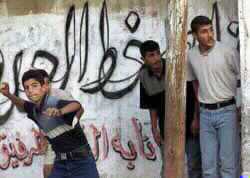Palestinian President Yasser Arafat on Wednesday called presidential and legislative elections for January 20 under international and domestic pressure to reform his government. The move, announced by the parliamentary speaker, turned Arafat's administration into a transitional government and some Palestinian officials said it would avert a parliamentary vote of confidence in his cabinet planned for later in the day.
Legislators had predicted an uphill battle for approval of the cabinet by the Palestinian Legislative Council, where Arafat -- who is widely expected to be re-elected -- has faced criticism for not doing enough to overhaul the government.
"The Palestinian people in the Gaza Strip, the West Bank and Jerusalem are invited to free and direct general elections, to elect the head of the Palestinian National Authority and members of the Legislative Council on Monday, 20th January, 2003," Arafat said in the decree, read in parliament by the assembly's speaker, Ahmed Korei.
It was not clear when or if parliament would be dissolved.
Arafat has been under intense U.S. and Israeli pressure to reform his Palestinian Authority, which is in charge of areas of the West Bank and Gaza Strip under interim peace deals with Israel.
President Bush called in June for a new Palestinian leadership uncompromised by "terrorism," making the creation of an independent Palestinian state conditional on sweeping democratic and other reforms and an end to violence.
Palestinians last held elections in 1996. Under the decree, Palestinians will be able to declare their candidacy for the presidency and legislature during a nine-day period starting from December 14.
Arafat had already vowed to hold elections between January 10 and 20, but had not set a date.
He has also said holding elections will be hard if Israeli forces continue to occupy or blockade Palestinian towns and villages -- measures the army says are needed to halt attacks in an almost two-year-old uprising against Israeli occupation.
DOUBTS OVER CONFIDENCE VOTE
Rawhi Fattooh, secretary-general of the Palestinian parliament, called the election decree "an attempt...not to have the PLC vote against the government."
Defeat in a confidence vote in the Palestinian Legislative Council would be a big blow for Arafat which legal experts said would oblige him to name a new cabinet.
Some Palestinian officials said a vote would not now be necessary because Arafat's decree automatically made the cabinet a transitional government. There was no official announcement, however, on whether the confidence vote would take place.
Arafat has kept a tight rein on power, despite efforts by the United States and Israel to sideline him.
But he faces criticism for not going far enough when he trimmed his government and named five new ministers in June under pressure from inside and outside the region to streamline his security services and clean up corruption.
"The general feeling among the lawmakers is that the government will not win (the parliament's) confidence," Adbel-Karim Abu Salah, head of the legislature's legal committee, told Reuters before Arafat issued his decree.
The vote was postponed on Tuesday as legislators considered whether they should vote on the entire cabinet or just on the new ministers. The legal committee was expected to resolve this dispute on Wednesday.
In the latest violence, Israeli tanks rolled into a Palestinian-controlled area of the northern Gaza Strip during the night, triggering sporadic gun battles before withdrawing several hours later, witnesses said.
The army said it arrested four men during the raid in the village of Beit Hanoun, north of Gaza City, and arrested six people in other parts of Gaza during the night. There were no reports of casualties.
At least 1,540 Palestinians and 591 Israelis have been killed since the uprising began in late September 2000.
PHOTO CAPTION
A Palestinian boy throws stones at Israeli tanks entering into a Palestinian-controlled area in the village of Beit Hanoun, September 11, 2002. (Ahmed Jadallah/Re
- Author:
& News Agencies - Section:
WORLD HEADLINES


 Home
Home Discover Islam
Discover Islam Quran Recitations
Quran Recitations Lectures
Lectures
 Fatwa
Fatwa Articles
Articles Fiqh
Fiqh E-Books
E-Books Boys & Girls
Boys & Girls  Articles
Articles










